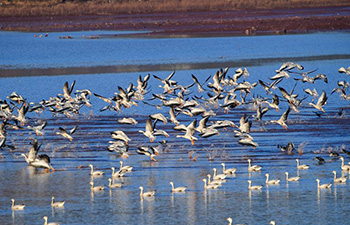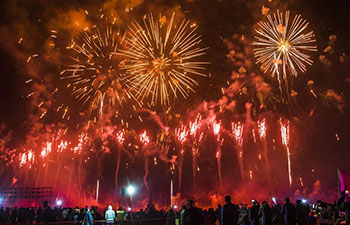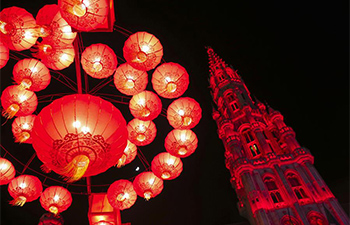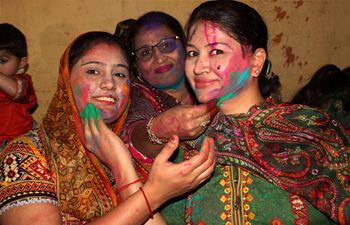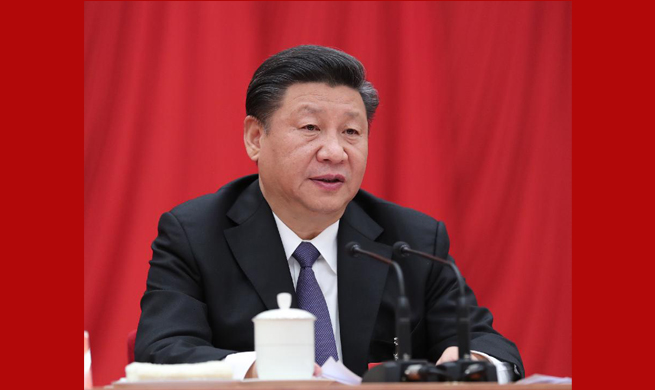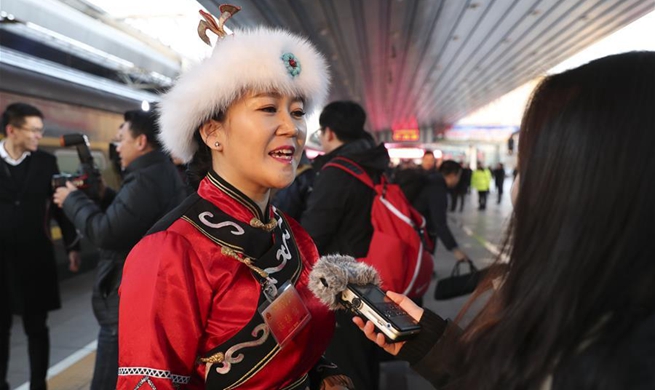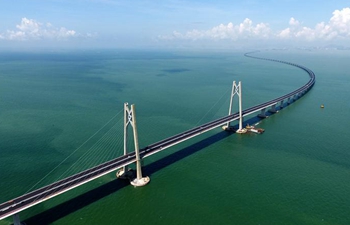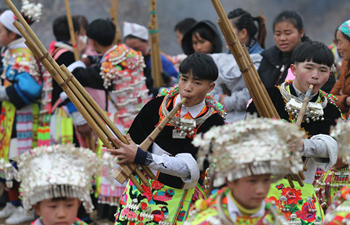RAMALLAH, March 2 (Xinhua) -- Palestinian Hossam Hamid and his families are feeling squeezed, as their home in the central West Bank city of al-Beira near Ramallah is sandwiched between a concrete wall erected by the Israeli authorities and a Jewish settlement.
The family can no longer enjoy a sip of hot coffee in the morning at the home garden which once boasted a natural landscape, because of the recently-erected six-meter-high wall.
Located at the Jalazon refugee camp, Hamid's home lies between Bet El Israeli settlement and the new 700-meter long wall Israel started to build in November.
The Israeli authorities have been accelerating the construction of the concrete barrier, especially after the U.S. decision to recognize Jerusalem as the capital of Israel in December, a move that has not only caused a surge in confrontations between Palestinian protestors and Israeli forces, but also jarred on the nerves of millions of Muslims across the globe.
Israel says the wall is meant to protect the settlers of Bet El from possible Palestinian attacks.
"It is a new illegal and unjustified violation against us," Hamid told Xinhua angrily. "It is the Israelis who attack us, not the opposite."
Hamid said his family has owned the home since 1978, years before the creation of the Israeli settlement.
"Life started to worsen after the settlement was founded," he lamented, looking helplessly.
Since the Israelis built the settlement, the family has been unable to do any construction works in their garden or expand their home which houses 22 people.
"We are now trapped between the wall and the settlement," Hamid said.
During the construction of the wall, the Israeli forces prevented Hamid's family from moving in or out of their home, keeping a hole in the home's wall as the only entrance for them.
Mahmoud Mubarak, the chairman of the Popular Committee for Services of Jalazon Refugee Camp, told Xinhua that the conditions of Hamid's family have become extremely difficult due to the construction of the Israeli wall.
Mubarak explained that the houses near or facing the settlement of Bet El are periodically attacked by settlers under the protection of the Israeli army.
"The danger of continuing the construction of the wall lies in the possibility of grabbing more Palestinian-owned lands," the Palestinian chairman warned.
The West Bank, which Israel occupied in 1967, is home to about half a million Jewish settlers, and 2.7 million Palestinian residents.
However, the tension between Palestinians and Israeli settlers often turns violent.
The Palestinians accuse the settlers of burning a large number of mosques and homes in different West Bank cities, writing racist slogans on their walls and attacking their properties, which took place almost on a daily basis.
Settlers' attacks are often condemned by the Israeli government, which has repeatedly vowed to sue the perpetrators. However, Palestinians say no practical action has yet been taken against the settlers.
The continuing expansion of Israeli settlements in the West Bank and East Jerusalem is the thorniest issue obstructing the resumption of the peace negotiation between Palestine and Israel, the last round of which lasted nine months and broke down in 2014.
Wasil Abu Youssif, a member of the Executive Committee of the Palestine Liberation Organization, believes that Israel is using the bias of the U.S. to escalate its illegal settlement plans.
"The Israeli government is trying to take advantage of the U.S. administration's support to deprive the rights of Palestinian refugees by confiscating as much of the Palestinian land as possible," Abu Youssif told Xinhua.
Israel now acts as if it has a green light to confiscate Palestinian lands for settlement purposes which contradicts all international conventions and agreements, he added.




